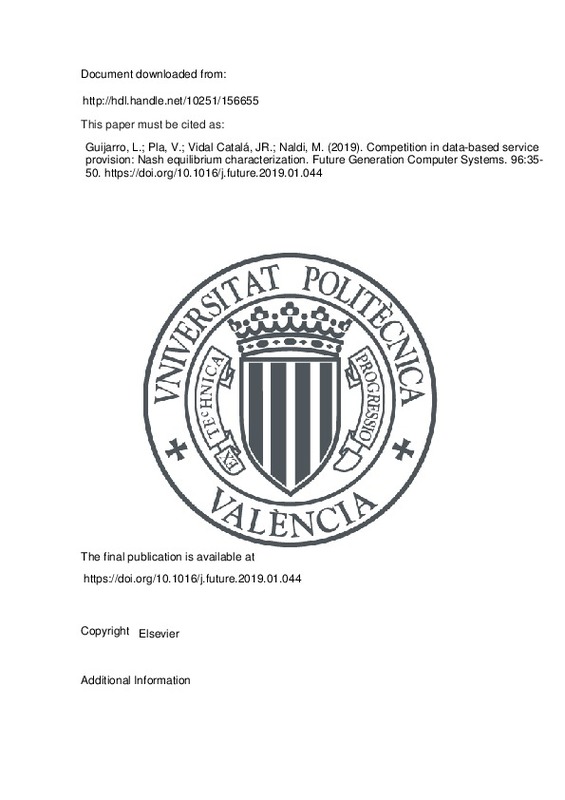JavaScript is disabled for your browser. Some features of this site may not work without it.
Buscar en RiuNet
Listar
Mi cuenta
Estadísticas
Ayuda RiuNet
Admin. UPV
Competition in data-based service provision: Nash equilibrium characterization
Mostrar el registro sencillo del ítem
Ficheros en el ítem
| dc.contributor.author | Guijarro, Luis
|
es_ES |
| dc.contributor.author | Pla, Vicent
|
es_ES |
| dc.contributor.author | Vidal Catalá, José Ramón
|
es_ES |
| dc.contributor.author | Naldi, Maurizio
|
es_ES |
| dc.date.accessioned | 2020-12-10T04:31:31Z | |
| dc.date.available | 2020-12-10T04:31:31Z | |
| dc.date.issued | 2019-07 | es_ES |
| dc.identifier.issn | 0167-739X | es_ES |
| dc.identifier.uri | http://hdl.handle.net/10251/156655 | |
| dc.description.abstract | [EN] This paper analyzes the economic feasibility of a market for data-based services, which is a scenario envisioned in sectors that are adopting Internet of Things and/or Big Data technologies. A business model for the provision of a data-based service is proposed. In this model, service providers build services from data that is collected and sold by data providers in a market, and provide services to final users. Service providers compete strategically against each other in the data market and in the service market. The strategic interaction between the service providers is analyzed by means of non-cooperative game theory. A thorough mathematical analysis of the Nash equilibria is carried out and existence and uniqueness conditions are proved and discussed. We conclude that if the sensitivity of users to the data-rate-to-price ratio is above the unity and the number of service provider does not exceed a given limit, a unique and meaningful equilibrium exists. We also conclude that the intensity of competition is beneficial for the users and detrimental for the service providers, while for the data providers, maximum surplus is obtained in an intermediate intensity of competition. Finally, an increase in the users¿ sensitivity to the data-rate-to-price ratio causes a shift on the surplus from both the service providers and data providers to the users. | es_ES |
| dc.description.sponsorship | This work has been supported by the Spanish Ministry of Economy and Competitiveness through project TIN2013-47272-C2-1-R. | es_ES |
| dc.language | Inglés | es_ES |
| dc.publisher | Elsevier | es_ES |
| dc.relation.ispartof | Future Generation Computer Systems | es_ES |
| dc.rights | Reconocimiento - No comercial - Sin obra derivada (by-nc-nd) | es_ES |
| dc.subject | Game theory | es_ES |
| dc.subject | Nash equilibrium | es_ES |
| dc.subject | Service provision | es_ES |
| dc.subject | Data providers | es_ES |
| dc.subject | Competition | es_ES |
| dc.subject.classification | INGENIERIA TELEMATICA | es_ES |
| dc.title | Competition in data-based service provision: Nash equilibrium characterization | es_ES |
| dc.type | Artículo | es_ES |
| dc.identifier.doi | 10.1016/j.future.2019.01.044 | es_ES |
| dc.relation.projectID | info:eu-repo/grantAgreement/MINECO//TIN2013-47272-C2-1-R/ES/PLATAFORMA DE SERVICIOS PARA CIUDADES INTELIGENTES CON REDES M2M DENSAS/ | es_ES |
| dc.rights.accessRights | Abierto | es_ES |
| dc.contributor.affiliation | Universitat Politècnica de València. Departamento de Comunicaciones - Departament de Comunicacions | es_ES |
| dc.description.bibliographicCitation | Guijarro, L.; Pla, V.; Vidal Catalá, JR.; Naldi, M. (2019). Competition in data-based service provision: Nash equilibrium characterization. Future Generation Computer Systems. 96:35-50. https://doi.org/10.1016/j.future.2019.01.044 | es_ES |
| dc.description.accrualMethod | S | es_ES |
| dc.relation.publisherversion | https://doi.org/10.1016/j.future.2019.01.044 | es_ES |
| dc.description.upvformatpinicio | 35 | es_ES |
| dc.description.upvformatpfin | 50 | es_ES |
| dc.type.version | info:eu-repo/semantics/publishedVersion | es_ES |
| dc.description.volume | 96 | es_ES |
| dc.relation.pasarela | S\384246 | es_ES |
| dc.contributor.funder | Ministerio de Economía y Empresa | es_ES |







![[Cerrado]](/themes/UPV/images/candado.png)

